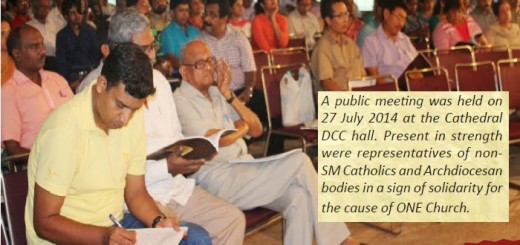THE CELIBATE DEBATE – Chhotebhai

 Hardly have I seen articles more challenging than those of the author Chhotebhai. Most of his catches are more or less like that – much bigger than even the boat. Chhotebhai is peeling a fishy item here. The bang will take some time to settle in the infinite. Abstinence, celibacy, priesthood….. the Franco Fiasco is getting into more twists.
Hardly have I seen articles more challenging than those of the author Chhotebhai. Most of his catches are more or less like that – much bigger than even the boat. Chhotebhai is peeling a fishy item here. The bang will take some time to settle in the infinite. Abstinence, celibacy, priesthood….. the Franco Fiasco is getting into more twists.
Forgive me, I remember an episode from the life of the mystic, Mullah Nasruddin. He was facing a divorce case trial in the court. The judge patiently heard the wife first and then turned to Nasrudiin for his excuses. He bowed very politely and began, “My Lord, there actually are three sides for the same truth. The first side of it you have already seen, another side I am going to open up now and on the third side is what actually happened.”
Just like this, here also we have three sides. Chhotebhai has beautifully briefed on the first two sides. May I stride across for the third. According to me anything in this universe is a bundle of energy – subtle and gross (perhaps more layers, one end touching the ultimate consciousness). Body wants gross energy and mind and consciousness need subtle energy. Chakras churn out the subtle from the gross and the gross from subtle and keeps the total body safe with the necessary grade of food at various points. Jesus refers to this aspect of energy consumption, by referring to ‘Man shall not live by bread alone……..’. More than a requirement for maintenance of the species, sex has more meanings and functions. Here it is union of two distinct polarities – the positive physical and the negative physical. On the road to conscious evolution there is another union, that is between gross and the subtle. We need tremendous energy to make this happen. Through prayers and similar disciplined spiritual exercises what we accumulate is more and more energy. To keep away from sex means getting more energy in reserve. This could be the only reason why sex is not recommended for spiritual aspirants. But alas, where everything is dipped in luxury and hypocrisy, may I frankly tell you that we are not on the expected track of revolutionary evolution and there is no meaning in burning without sex. Let loose all the geese! Joseph Mattappally (Asso. editor CCV)
Read the Chhotebhai article

Chhotebhai
“The view that many priests and seminarians believe that celibacy does not require abstinence from sexual acts, but from marriage, seems quite common. Interviewing an ex-seminarian for a job not too long ago, he said that his reason for leaving was being forced into sex by colleagues and superiors. Not quite believing him I approached the husband of the lady who taught English in the same seminary (she had died a couple of months ago), who confirmed that. On another occasion, when my wife was talking to the seminarians about family life they told her that they knew so little about sex that the superior had handed out pornographic material for learning!! One wonders”.
The respondent wanted some clarification on the subject. I can understand human frailty and the strong sex urge, because I am also a “normal” human being. However, the justification proffered by the seminarians and their “superiors” got my goat. When my wife read the email she was even more shocked.
Super intelligent people are past masters at self-justification. Like good lawyers they can give hair-splitting arguments to defend their clients. But such self-justification is inappropriate in a seminary that seeks to teach morality to others. It is the height of religious hypocrisy that Jesus repeatedly and roundly condemned.
As a married man, if I have a torrid affair with another woman that just stops short of genital penetrative sex (the legal definition for establishing rape), can I claim to be faithful to my marital bond? Bill Clinton used a similar defence for his affair with his intern Monica Lewinski in the Oval office, because he only had oral sex; so he could blatantly lie before TV cameras saying “I did not have sex with that woman”.
Or can a person eating meat claim to be a vegetarian on the specious plea that he has not killed or slaughtered any animal? It is patently absurd. If our so-called celibates still insist that sexual abstinence (continence) is not the same as celibacy then we need to seriously examine the entire issue. In order to answer my respondent’s query I had to delve really deep.
I shall begin with the teachings of Vatican II. The “Decree on the Ministry and Life of Priests” (P.O.) has much to say. “With respect to the priestly life, the Church has always held in especially high regard perfect and perpetual continence” (P.O. 16). Notice that the word used is continence, not celibacy.
There is a rider. “It is not indeed demanded by the very nature of the priesthood, as is evident from the practice of the primitive Church, and from the tradition of the Eastern Churches. In these Churches in addition to all bishops and those others, who by a gift of grace, chose to observe celibacy, there also exist married priests of outstanding merit” (Ibid). And again, “In the Latin Church, it was imposed by law on all who were to be promoted to sacred orders. This legislation, to the extent that it concerns those who are destined for the priesthood, this most holy Synod again approves and confirms” (Ibid).
So while not being intrinsic to the priesthood, those who submit to its authority, need to abide by it. Further, “Many men today call perfect continence impossible. The more they do so, the more humbly and perseveringly priests should join with the Church in praying for the grace of fidelity. It is never denied to those who ask” (Ibid). So what is impossible for man is possible for God. It is a gift to those who believe.
To attain this, the “Decree on the Appropriate Renewal of the Religious Life” (P.C.) advocates “mortification and custody of the senses” (P.C. 12). So lessons in pornography are certainly not the answer. One might here add that priests that live flamboyant lifestyles cannot be expected to be continent. There is also some more good advice. “Chastity has stronger safeguards in a community when true fraternal love thrives among its members” (Ibid). “Since the observance of total continence intimately involves the deeper inclinations of human nature, candidates should not undertake the profession of chastity … except after a truly adequate testing period, and only if they have the needed degree of psychological and emotional maturity” (Ibid). The problem here is that very few priests live in community, with mutual support, so any psychological imbalance gets severely accentuated.
The “Decree on Priestly Formation” (O.T.) continues in similar vein, emphasising maturity, magnanimity, freedom of choice and rightness of intention. “Depending on the age of each seminarian and his state of progress, careful enquiry should be made concerning the rightness of his intention and the freedom of his choice” (O.T. 6). It says that seminarians should perceive “the superiority of virginity consecrated to Christ, so that by a choice that is maturely thought out and magnanimous, they may attach themselves to God by a total gift of body and soul” (O.T. 10).
Many moons ago, when I was involved in youth and vocations ministry, I had noticed that most candidates joined the priesthood or religious life spurred by some pious illusion, based on what some relative had told them. Once in the system it was hard to get out. So they clung on, making a mockery of their vows, suffering in frustration, and venting it on others. Earlier there was much stigma attached to being an ex-seminarian or religious. Fortunately that ostracisation has reduced considerably today. But I still believe that teenagers entering a “minor seminary” are just not mature enough to have rightness of intention or freedom of choice. Last year, on a visit to Assisi, I stayed in the Capuchin Provincialate. They had several novices. The youngest was over 30, and the oldest was about 70! A stark contrast to the “fishing for vocations” that we do in India.
Other documents that talk of celibacy may not specifically refer to continence, probably because it is presumed. Canon Law says that in the Latin Church priests are obliged to live a celibate life (cf Can 1037). The official Catechism of the Catholic Church (CCC) toes the line of Vatican II. It reiterates that in the Latin Rite priests must be celibate (CCC 1579), though in the Eastern Churches married men may become priests (CCC 1580).
Besides genital penetration the CCC says that “masturbation is an intrinsically and gravely disordered action” (CCC 2352). However moral responsibility “must take in to account the affective immaturity, force of acquired habit, conditions of anxiety, or other psychological or social factors that can lessen, if not even reduce to a minimum, moral culpability” (Ibid).
It also warns against pornography, calling it a grave offence that should be prevented by civil authorities (cf CCC 2354). It certainly cannot be advocated by seminary professors.
India’s greatest contemporary theologians, Neuner and Dupuis, both Jesuits, in their book “The Christian Faith” give a glimpse into how celibacy evolved in the Church. They indicate that continence is a pre-requisite for celibacy.
“Till the third century bishops and priests were mostly married men … By the fourth century the unmarried clergy became the majority, by then too, ordained ministers were forbidden to enter the married state. Celibacy however was not imposed as a rule, but continence in marriage was gradually required from the married clergy of the Western Church. The first document that witnesses to this is found in the Council of Elvira, Spain (300-303 AD). In the sixth century continence became a clear obligation for the clergy of the Western Church … The evolution from the law of clerical continence to that of clerical celibacy is a much later development” (pg 484).
Jesus himself was forthright in saying that this form of life was not meant for all and sundry. “It is not everyone who can accept what I have said, but only to those to whom it is granted. There are eunuchs born so from their mother’s womb, there are eunuchs made so by human agency, and there are eunuchs who have made themselves so for the sake of the kingdom of Heaven. Let any one accept this who can” (Mat 19:11-12).
One would then be constrained to conclude that becoming a eunuch (not having sex in any form) was not expected to be a common thing, as churned out in the thousands from our seminaries. I somehow feel that Jesus foresaw this as a special gift for a select few only.
From the history of the Church, more so in the Latin rite, we see a gradual evolution of continence and celibacy for the priesthood. Perhaps it is time to back pedal, to allow celibacy to be made optional as before. I fully support the demand for married clergy and even for women to be ordained priests. I may not see this happening in my own life time. It does not prevent me from looking in to the future with hope. The celibate debate is wide open.
* The writer has several years of experience in youth ministry, vocation promotion and marriage counselling.

















2. Canon-282.1: Clerics are to follow a simple way of life and avoid anything which smacks of worldliness.
Very scholarly indeed. I agree with you that celibacy should be optional. I always regarded compulsory celibacy a violation of human rights. It is against the natural order of the things to which a man is created to be subject to. Being married and remaining a loyal husband to a woman should not be a disqualification to do what Jesus commanded his disciples: 'proclaim the Word'. Catholic Church has complicated things by its man-made rituals (sacraments) which have hardly any support in bible. And an aura around these rituals got evolved so much so that it is imbedded in the psyche of the believers that that is all to being a Catholic and absent an unmarried priest doing it, the ritual is unclean and invalid. I am afraid that unless Vatican addresses changes to sacraments first, the celibacy requirement cannot be removed. Believers will revolt.
History, philosophy, theology and so many other human sciences take ages to evolve. We are passing through uncharted waters. I for one can only pray that the Holy Church remains ever victorious. God has a mighty task. He has to look after every individual for all times.
Clerical celibacy was started by the Church about 1000 years ago. Some people say St. Augustine's writings were accepted to come to this decision – people conveniently forget that Augustine had a wife and a 13 yer old son when he heard the speech of St. Ambrose and converted to Christianity and Caholic Church. He stated writing about the importance of celibacy. The reason was he was an educated man at that time and the Church accepted his writings. At the same time we may have to consider the following advice: "For a monk to have at least once in his life experience carnal passion, so that he can one day be indulgent and understanding with the sinners he will counsel and console.. well dear. Also it is not a thing to be wished before it happens, but it is not something to vituperate too much once it happened." Thomas Aquinas had said "On fact, the acts of the sensitive appepetite are called passions precisely because they involve a bodily change." Pope Francis said" "A Christianity which 'does' little in practice, while incessantly 'explaining its teachings is dangerously unbalanced." Need to think seriously about these points.